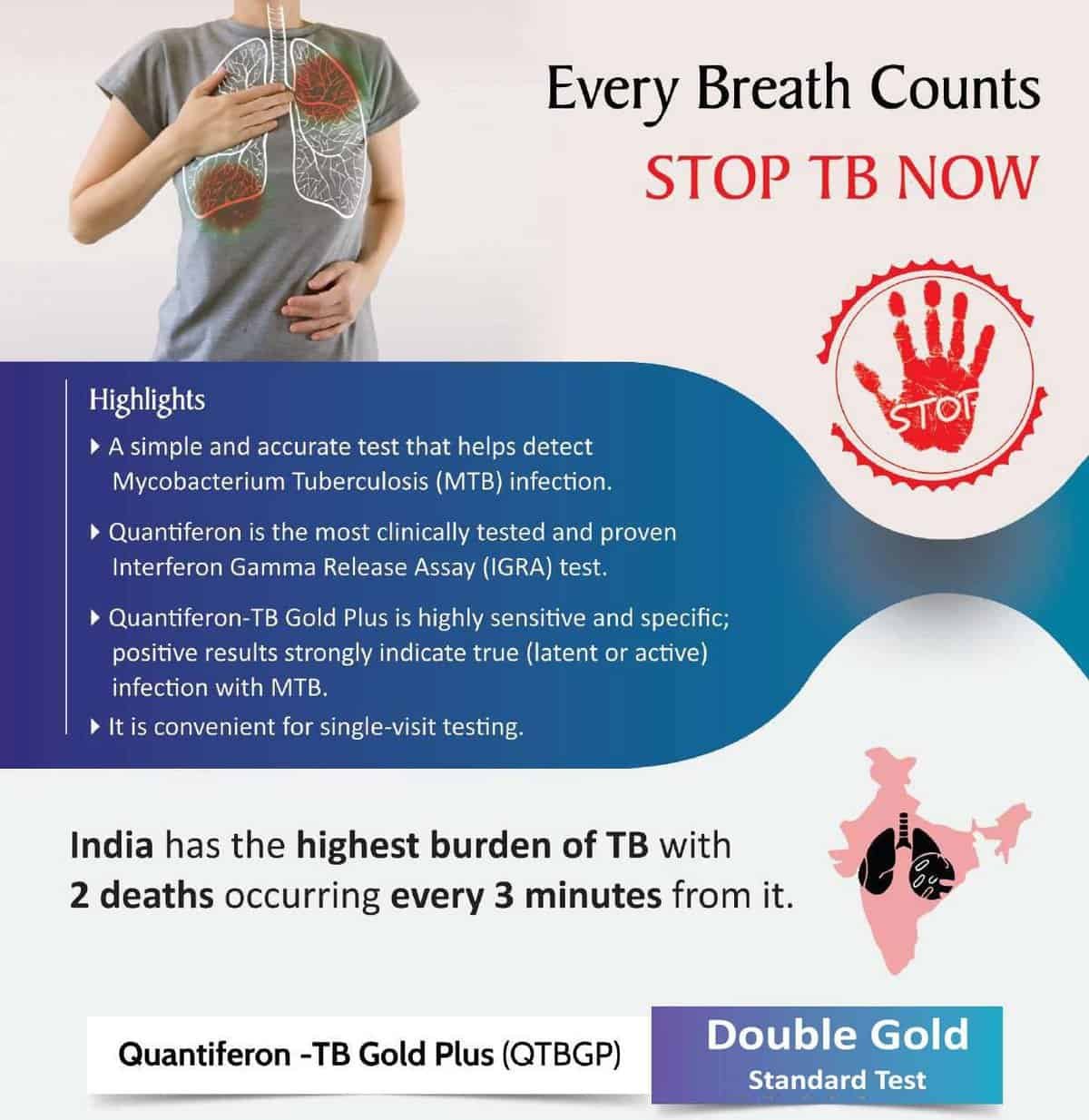QuantiFERON® TB Gold Plus (IGRA) – Focus TB by Thyrocare
Clinically trusted blood test for detecting immune response to Mycobacterium tuberculosis antigens. Home collection available in most Indian cities.
Special Price: ₹2,780 MRP: ₹5,560 (Flat 50% Off)
Also known as: TB IGRA | Brand: Focus TB | Lab: Thyrocare

A comprehensive tuberculosis test panel by Focus TB, a unit of Thyrocare. Towards a TB-free world – price cut by half.
Test Overview
QuantiFERON® TB Gold Plus (QFT-Plus) is an interferon-gamma release assay (IGRA). It measures cell-mediated immune response to TB-specific antigens using whole blood. A positive result indicates immune sensitization to TB antigens, consistent with prior exposure or infection; clinical correlation is essential to distinguish latent from active disease.
Who benefits: individuals with persistent cough (>3 weeks), fever, night sweats, weight loss, known TB exposure, pre-employment/college health checks, and those requiring screening before immunosuppressive therapy.
Interpretation & limitations
- This assay is indirect—use with clinical evaluation, imaging, and microbiology as indicated.
- False positives may occur with prior infection by M. marinum, M. szulgai, or M. kansasii.
- Negative results do not exclude TB infection/disease. Early testing, immunosuppression, or technical pre-analytics can lower response.
- Consider repeat testing after 8–10 weeks if exposure was recent and suspicion remains high.
- Indeterminate results are more likely in HIV with CD4 ≤ 200 cells/µL, in children < 4 years, recent illness/vaccination, or low lymphocyte counts.
- IFN-γ magnitude does not correlate with disease stage or treatment response.
Booking, collection & TAT
- Book in 20 minutes: WhatsApp us and receive confirmation; home collection from – in most cities.
- Sample type: Whole blood in two Lithium Heparin vials. Quantity: 3 ml + 3 ml (total 6 ml). Fasting: Not required.
- TAT: ~56 hours after samples reach the Central Processing Lab (CPL).
- Mandatory requisition: patient name, full postal address, date of birth, contact no., referring doctor’s name & contact, and signature.
- Reports: Secure online access; counseling/doctor follow-up recommended if positive/indeterminate.
Stimulated tubes & final readout
| Test Parameter | Methodology | Analyzer | Technology |
|---|---|---|---|
| Tb1 Antigen Tube minus Nil Tube | IGRA (Interferon-Gamma Release Assay) | N/A | E.L.I.S.A |
| Tb2 Antigen Tube minus Nil Tube | IGRA (Interferon-Gamma Release Assay) | N/A | E.L.I.S.A |
| Mitogen Tube minus Nil Tube | IGRA (Interferon-Gamma Release Assay) | N/A | E.L.I.S.A |
| Nil Tube | IGRA (Interferon-Gamma Release Assay) | N/A | E.L.I.S.A |
| Final Result | Algorithmic interpretation | Qualitative: Positive / Negative / Indeterminate | Clinician correlation required |
QuantiFERON TB Gold Plus Test Details
Other name: TB IGRA | Brand: Focus TB | Lab: Thyrocare
Clinical description
QFT-Plus deploys TB-specific antigens (ESAT-6 and CFP-10) to stimulate T-cells. The resulting interferon-gamma (IFN-γ) is quantified by ELISA. Positive results reflect sensitization to TB antigens from prior exposure or infection. Use results with patient history, examination, chest radiography, and microbiology to differentiate latent vs. active disease.
When to consider testing
- Symptoms suggestive of TB: persistent cough, fever, night sweats, weight loss, fatigue.
- Close contact of a known TB case; workplace or institutional screening; pre-biologic therapy baseline.
- Pre-employment fitment, college/hostel health checks, or visa/immigration requirements where IGRA is accepted.
Book Health Checkup Package
Book Now, Pay Later
- Home/Office sample pickup
- Online reports within ~48 hours (post-analysis availability may vary with logistics/TAT)
- Need help? +91 7070 177 147 [8:00–21:00 IST]
Sample & Logistics
- Sample type: Blood in two Lithium Heparin vials
- Sample quantity: 3 ml + 3 ml = 6 ml total
- Fasting: Not required
- TAT: ~56 hours after the sample reaches the Central Processing Lab
- Mandatory TRF details: Full name, complete postal address, date of birth, contact number, referring doctor’s name & contact, and patient/guardian signature
Important Notes
- This is an indirect test for TB infection, intended to be used with clinical findings and other diagnostics.
- Possible false positives with non-tuberculous mycobacteria like M. marinum, M. szulgai, and M. kansasii.
- A negative result does not preclude TB infection or disease.
- False negatives may occur early in infection or with immunosuppression/co-morbidities.
- CDC suggests repeat testing after 8–10 weeks following recent exposure when suspicion remains high.
- Indeterminate results: more frequent in HIV (CD4 ≤ 200/µL), children < 4 years, recent illness/vaccination, or low lymphocyte counts.
- IFN-γ level cannot be used to stage disease, predict progression, or monitor therapy.
Clinical Comments & Caution
Use IGRA results alongside exposure risk assessment, radiography, sputum studies where indicated, and physician evaluation. For pediatric cases and immunocompromised states, consult a specialist for test selection and interpretation.